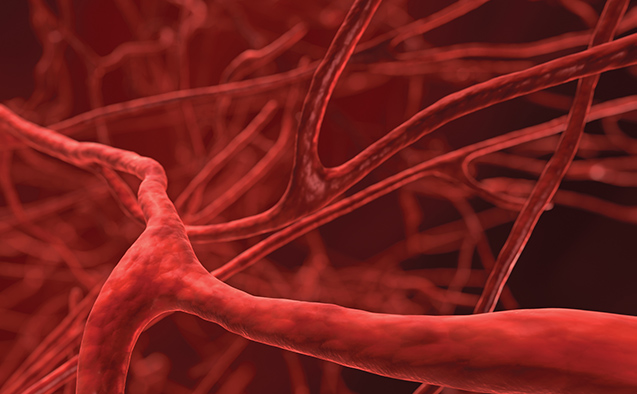New hope for treating cardiovascular diseases
Wake Forest researchers study how a novel signaling molecule might regulate blood flow, blood pressure

In a significant step toward developing new treatments to mend blood vessels damaged by heart attacks and strokes, and even from chronic diseases like diabetes and obesity, scientists at Wake Forest University have discovered how to amplify the effects of an important signaling molecule in the blood.
That molecule, nitric oxide, regulates blood flow and the activation of platelets, which form clots. In a new study published today in the peer-reviewed journal Nature Chemical Biology, Wake Forest physics researcher Daniel B. Kim-Shapiro and colleagues from the University of Maryland School of Medicine show how nitric oxide can be stabilized for potential therapeutic uses.
Typically, nitric oxide’s ability to prevent unwanted results such as low blood flow or clotting is short-lived – limited by molecules in the blood and muscle such as hemoglobin and myoglobin.
But the researchers stabilized nitric oxide (NO) by using a small, antioxidant thiol called glutathione to bind it to heme, a molecule found in hemoglobin and many other hemoproteins. That created a reduced heme compound called NO-ferroheme. The researchers found that NO-ferroheme has vasodilation effects, increasing blood flow in the arteries and lowering blood pressure in mice. It also inhibited platelet aggregation, or clotting, in human blood platelet samples.
“One of the most surprising things that came out of our study was the role of the glutathione, both in the novel chemistry in forming the NO-ferroheme and in its effects in vivo,” said Kim-Shapiro, study co-lead and co-corresponding author of the paper “Thiol-catalyzed formation of NO-ferroheme regulates intravascular NO signaling.” “We still have a lot more work to do to fully understand this.”
The research is part of a decades-long study of cardiovascular diseases by Kim-Shapiro, chair of Wake Forest’s Department of Physics, Harbert Family Distinguished Chair for Excellence in Teaching and Scholarship and director of the Translational Science Center.
With the Nature Chemical Biology publication, he was able to address the mystery of how NO signals under conditions that suggest it would lose its potency very rapidly.
Heme, an iron-containing compound abundant in all human cells, binds to NO and can potentially ferry it around the vascular system, where it can signal to the cells that regulate blood flow, blood pressure, blood clot formation and other processes.
Kim-Shapiro and study co-lead and co-corresponding author Mark T. Gladwin, MD, of the University of Maryland School of Medicine, have collaborated for about 20 years on determining how NO signals in the blood.
“The stabilization of NO by forming NO-ferroheme allows it to diffuse across distances, almost like a chemical flying saucer, to directly bind to and activate target enzymes that control blood flow,” Gladwin said.
At Wake Forest University, the research team included Laxman Poudel, Elmira Alipour and Yiyang Jiang of the Department of Physics, and Swati Basu of both the Physics Department and the Translational Science Center.
Poudel, a doctoral student who works in Kim-Shapiro’s lab, shares first authorship of the Nature Chemical Biology study with Anthony W. DeMartino, a Wake Forest graduate (‘10) and professor at the University of Maryland School of Medicine. Under Kim-Shapiro’s direction, Poudel performed the experiments combining NO, heme and glutathione upon which the study is based.
“It would elevate my purpose in life if this benchwork discovery of a swift and a remarkably stable NO-ferroheme formation progresses as the future of NO therapeutics and makes a difference for people,” Poudel said.
This work was funded by the National Institutes of Health (HL125886 and HL098032) and from funding from the Department of Defense (W81XWH2210198).
Kim-Shapiro said next steps in this line of research include exploring at how other thiols interact with NO. His previous research has looked at how the nitrate found naturally in beets could, through production of NO, enhance sports performance and might combat the progression of dementia in older adults.
Categories: Top Stories
Wake Forest News
336.758.5237
media@wfu.edu
Meet the News Team
Headlines
Wake Forest in the News
Wake Forest regularly appears in media outlets around the world.




